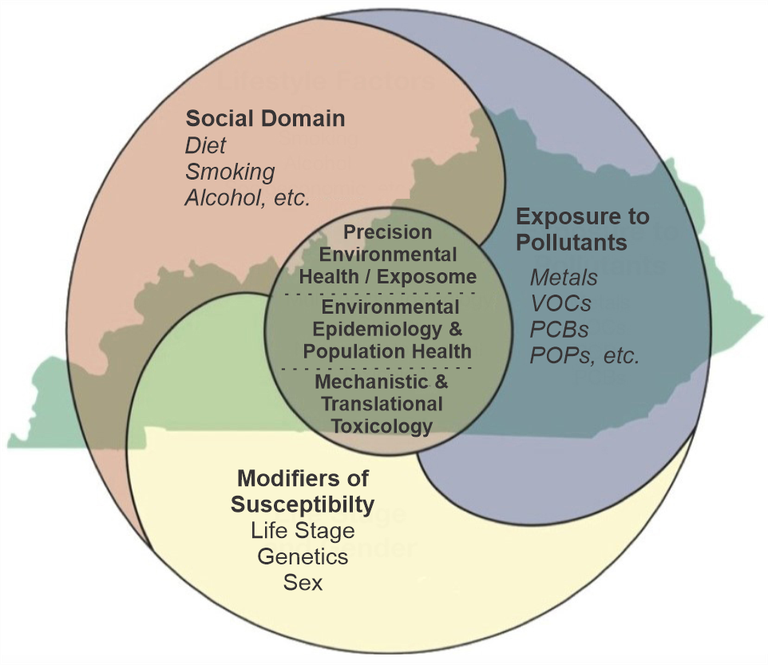Translational Research Support Core
The Center for Integrative Environmental Health Sciences (CIEHS) explores the etiology of chronic diseases as driven by interactions of environmental toxicants with the social domain, and influenced by life stage, genotype and sex (Fig. 1). The Center’s EHS identity is forged by Kentucky’s urbanrural environmental pollution exposure paradox and the Research Interest Groups (RIGS). The Translational Research Vision is to create streamlined connections between these EHS ideas and researchers to the materials, subjects, and tools needed to further translate their work in ways that are collaborative, efficient, ethical, and relevant to the community. In support of the CIEHS Strategic Vision, the Translational Research Core (TRSC) will build on its previous success in facilitating translation of research, using funding renewal to further expand, connect, and streamline our efforts using the NIEHS Translational Research Framework (TRF) as a guide. The Translational Research Support Core (TRSC) provides infrastructure, integration, and financial support for research in four areas related to the elements of the NIEHS TRF where CIEHS has needs and expertise: Basic Science, Clinical Science, Geographic Information Sciences (GIS), and Epidemiology & Population Health (Fig. 2). To facilitate overall integration and translational impact, CIEHS Deputy Director (Matt Cave, MD, a NIEHS R35 Awardee) also serves as TRSC Director. TRSC advantages CIEHS Career Development Program (CDP) Participants through higher prioritization and core utilization subsidies.

The Specific Aims the CIEHS TRSC are:
1. Recruit and engage investigators to translational environmental health science research. TRSC builds and maintains an agile multidisciplinary research team responsive to CIEHS’s translational research needs. TRSC’s team is active across all Center components and fosters translational research. The team educates/trains and proactively recruits/engages investigators to translational EHS research. TRSC removes obstacles by reducing the cost of research to investigators. TRSC receives and prioritizes requests for research support and is the default entry/starting point for CIEHS research.
2. Enhance extramurally-funded EHS research projects and foster the development of new interdisciplinary Center research through intellectual support, team science approaches, and core utilization subsidies. TRSC provides consultations to guide investigators seeking to translate their research findings. It builds multidisciplinary teams to extend existing projects in new directions and develop new CIEHS research. These teams foster collaborative research efforts among basic scientists, clinical researchers, community engagement experts, and/or public health practitioners. TRSC facilitates partnerships with community-based organizations that impact clinical and public health. It intentionally develops research projects that incorporate more than one of TRSC’s four supported research areas (Fig. 2) or are otherwise consistent with the TRF. Community-engaged research and research to improve early detection, prevention, and/or therapy of environmentally related disorders is developed. TRSC manages the CIEHS Core Utilization Subsidy Program (CUSP) to financially support CIEHS projects and incentivize Core utilization. Key EHS grants currently supported by CIEHS include those from NIEHS, other NIH Institutes or Centers, and Department of Defense (DOD).
3. Provide access to services and resources that foster integrated and translational research and manage TRSC operations. TRSC provides services and access to research resources in its four supported areas: Clinical Science, Basic Science, GIS, and Epidemiology & Population Health. It supports overall Center integration. TRSC maintains, evaluates, and optimizes its Core operations to meet its goals and evolves over time to meet the needs of CIEHS.
Impact: The TRSC provides the infrastructure required to develop, subsidize, and conduct translational EHS research in partnership with investigators in support of the Center’s overall themes, EHS identity, strategic vision, and aims.
TRSC Leadership:

TRSC Director and Basic Science Navigator, Matt Cave, MD, is Distinguished University Scholar and Professor of Gastroenterology, Hepatology & Nutrition in the UofL School of Medicine (ULSOM) and the Louisville VAMC.

TRSC Associate Director and Adult Clinical Science Navigator, Jiapeng Huang, MD, PhD, is a Professor and Vice Chairman of Anesthesiology and Perioperative Medicine in the ULSOM and MTT RIG member.

TRSC Pediatric Clinical Science Navigator, Janice Sullivan, MD, is a Professor and Vice Chair for Research in ULSOM’s Department of Pediatrics and EHC RIG member.

TRSC Geographic Information Sciences Navigator, Charlie Zhang, PhD, is a Professor of Geographic & Environmental Sciences and Urban Planning & Public Affairs in the UofL College of Arts and Sciences and EHC RIG member.

TRSC Epidemiology and Population Health Navigator, Kira Taylor, PhD, is an Associate Professor in the Department of Epidemiology and Population Health (DEPH) in the School of Public Health and Information Sciences and PEHE RIG member.
